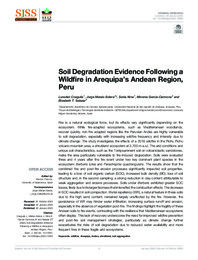Título :
Soil Degradation Evidence Following a
Wildfire in Arequipa’s Andean Region,
Peru |
Autor :
Coaguila, Lunsden
Mataix-Solera, Jorge 
Nina, Sonia
García-Carmona, Minerva
Salazar, Elizabeth T. |
Editor :
Frontiers |
Departamento:
Departamentos de la UMH::Agroquímica y Medio Ambiente |
Fecha de publicación:
2025 |
URI :
https://hdl.handle.net/11000/36239 |
Resumen :
Fire is a natural ecological force, but its effects vary significantly depending on the
ecosystem. While fire-adapted ecosystems, such as Mediterranean woodlands,
recover quickly, non-fire adapted regions like the Peruvian Andes are highly vulnerable
to soil degradation, especially with increasing wildfire frequency and intensity due to
climate change. The study investigates the effects of a 2018 wildfire in the Pichu Pichu
volcano mountain area, a shrubland ecosystem at 3,700 m a.s.l. The arid conditions and
unique soil characteristics, such as the Torripsamment soil on volcaniclastic sandstones,
make the area particularly vulnerable to fire-induced degradation. Soils were evaluated
three and 4 years after the fire event under two key dominant plant species in the
ecosystem: Berberis lutea and Parastrephia quadrangularis. The results show that the
combined fire and post-fire erosion processes significantly impacted soil properties,
leading to a loss of soil organic carbon (SOC), increased bulk density (BD), loss of soil
structure and, in the second sampling, a strong reduction in clay content attributable to
weak aggregation and erosive processes. Soils under Berberis exhibited greater SOC
losses, likely due to its larger biomass that intensified the combustion effects. The decrease
in SOC resulted in soil compaction. Water repellency (WR), a natural feature in these soils
due to the high sand content, remained largely unaffected by the fire. However, the
persistence of WR may hinder water infiltration, increasing surface runoff and erosion,
especially in the absence of vegetation post-fire. The findings highlight the fragility of these
Andean soils to fire events, contrasting with the resilience that Mediterranean ecosystems
often display. This lack of recovery underscores the need for improved wildfire prevention
and post-fire soil management strategies, particularly as climate change further
exacerbates the risks of soil degradation due to reduced water availability and more
frequent fires in these fragile arid ecosystems.
|
Palabras clave/Materias:
wildfire
Arequipa
Andes
shrubland
soil aggregation |
Área de conocimiento :
CDU: Ciencias puras y naturales: Química |
Tipo de documento :
info:eu-repo/semantics/article |
Derechos de acceso:
info:eu-repo/semantics/openAccess
Attribution-NonCommercial-NoDerivatives 4.0 Internacional |
DOI :
https://doi.org/10.3389/sjss.2025.13983 |
Publicado en:
Spanish Journal of Soil Science January 2025 | Volume 15 | Article 13983 |
Aparece en las colecciones:
Artículos Agroquímica y Medio Ambiente
|
 La licencia se describe como: Atribución-NonComercial-NoDerivada 4.0 Internacional.
La licencia se describe como: Atribución-NonComercial-NoDerivada 4.0 Internacional.
.png)
